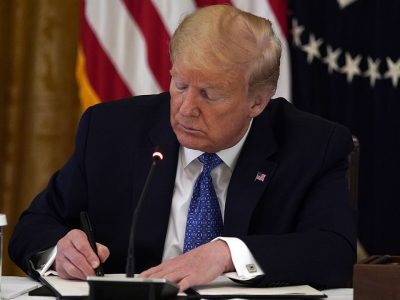 In an Executive Order issued last Thursday, Trump told agencies to use emergency waivers to avoid environmental safeguards. The Order is legally shaky and unlikely to accomplish much. Still, it provided a nice photo op. Maybe he should have signed it in front of a church. I’ll talk later about the specifics, but first I’d …
In an Executive Order issued last Thursday, Trump told agencies to use emergency waivers to avoid environmental safeguards. The Order is legally shaky and unlikely to accomplish much. Still, it provided a nice photo op. Maybe he should have signed it in front of a church. I’ll talk later about the specifics, but first I’d …
Continue reading "Trump’s Latest Deregulatory Ploy: Emergency Waivers"
The post Trump’s Latest Deregulatory Ploy: Emergency Waivers appeared first on Legal Planet.
#nicephoto #executiveorder
In an Executive Order issued last Thursday, Trump told agencies to use emergency waivers to avoid environmental safeguards. The Order is legally shaky and unlikely to accomplish much. Still, it provided a nice photo op. Maybe he should have signed it in front of a church.
I’ll talk later about the specifics, but first I’d like to explain why this will probably have less impact than you might think. Like many of Trump’s executive orders, there’s more smoke here than fire.
The Executive Order begins by saying that Trump has declared the coronavirus to be a national emergency, that social distancing has caused a severe recession, and that regulations shouldn’t get in the way of a speedy economic recovery. Notably, the Order does not say that there is an economic state of emergency; it defines the term “the emergency” to refer to the coronavirus outbreak. The Order then directs agencies to use existing emergency provisions to expedite infrastructure projects. In other words, it tells agencies to take actions that they could have taken on their own anyway. A tweet or a phone call would have had the same effect as a formal executive order.
There will be predictable legal challenges to agency actions carrying out the order. The existing agency waiver provisions are based on the need for fast action in an emergency. Trump did reluctantly declare a national emergency involving the coronavirus. It seems like a real stretch to call building an oil pipeline part of the emergency response to the coronavirus, just because the public health response to the coronavirus caused a recession.
There will also be arguments that agencies acted arbitrarily in how they applied existing waiver provisions in specific cases. These provisions generally don’t provide complete excuses to ignore legal requirements; they merely allow the agency to loosen the requirements. There will be disputes about whether an agency loosened the requirement too much in a particular situation.
Mandating short-cuts at the agency level may temporarily speed things up, but those short-cuts may cause greater delays when the inevitable lawsuits are filed. Short-cut procedures reduce the agency’s ability to compile a formal administrative record and a careful explanation of its actions. That may cause complications in litigation, such as the need for discovery to determine what information the agency actually considered. It can also lead to calls to reopen the record so that the agency or the court can consider additional information. In the end, no time may be saved.
The legal uncertainties may make businesses reluctant to rely on these emergency waivers. That may be particularly true given the risk that, even before construction can begin, there might be a “new sheriff in town” in the form of Joe Biden. Biden would likely withdraw all the waivers. In the end, the Executive Order may not do much to expedite infrastructure projects. The upside is that it also may not do much to harm the environment.
Now let’s turn to the specific statutes. I agree with Holly Doremus’s post that the legal basis for Trump’s order is shaky. The following comments build on her incisive critique.
The National Environmental Policy Act (NEPA). NEPA is the law that requires agencies to write environmental impact statements. A regulation issued by the White House Council on Environmental Quality (CEQ) covers emergencies. It provides:
Where emergency circumstances make it necessary to take an action with significant environmental impact without observing the provisions of these regulations, the Federal agency taking the action should consult with the Council about alternative arrangements. Agencies and the Council will limit such arrangements to actions necessary to control the immediate impacts of the emergency. Other actions remain subject to NEPA review.
Although the CEQ’s instructions on complying with NEPA are called regulations, CEQ does not actually have the power to issue binding rules. So it’s really issuing guidelines. CEQ’s interpretation of the emergency guideline will get some deference from a court, but not as much as if it were a legally binding regulation.
It’s not at all clear that the guideline applies to the situation described by the President anyway. It includes only “actions to control the immediate impacts of the emergency.” The emergency declared by the President is the coronavirus, not the recession. The macroeconomic effects of public health measures to respond to a disease don’t seem like a “immediate impact” of the disease. Not unless “immediate” means something like “indirect and possibly removed in space and time.”
In addition, the CEQ guideline contemplates that the agency will make “alternative arrangements.” So presumably there would be judicial review of whether the alternative arrangement was satisfactory, given the circumstances. The agency would have to explain why it was “necessary” to eliminate the normal environmental impact statement and why the particular alternative arrangement was the best it could do.
The Endangered Species Act (ESA). Oddly, the Executive Order refers to but does not cite the regulation under the ESA dealing with emergencies. Perhaps the drafters were in too much of a rush to look it up. Or maybe they were hoping to hide how poorly the ESA regulation fits this situation.
The first part of the ESA regulation reads as follows:
(a) Where emergency circumstances mandate the need to consult in an expedited manner, consultation may be conducted informally through alternative procedures that the Director determines to be consistent with the requirements of sections 7(a)-(d) of the Act. This provision applies to situations involving acts of God, disasters, casualties, national defense or security emergencies, etc.
I guess a pandemic qualifies under the “etc.” in the final sentence. But does the pandemic itself “mandate the need to consult in an expedited manner,” where the need relates to an economic situation flowing indirectly from the pandemic? That seems debatable.
Moreover, you’ll note that only the consultation requirement is affected. The agency’s core legal responsibility to avoid any action that would jeopardize an endangered species remains fully in effect. Shortcutting the consultation process may only result in more legal trouble when the ill-informed agency tries to move forward with the project.
Moreover, the exemption given by this part of the language is only temporary. The remaining section of the regulation provides that “formal consultation shall be initiated as soon as practicable after the emergency is under control.” Unless the infrastructure project moves very quickly, the agency is going to have to go through the whole process anyway. That means that the exemption has limited value.
The Clean Water Act (CWA). The waiver here relates to the regulations dealing with dredging and filling. The Executive Order refers to the existence of an emergency regulation without citation to the particular regulation in question. (Don’t they have any lawyers at the White House? A law student would get slapped down for that sloppiness.) The situation described by the Executive Order doesn’t seem to apply to the Army Corps’ regulation. The regulation regulation speaks of a situation that would occur if “corrective action” generally requiring a permit is not undertaken quickly. For instance, if a levee isn’t repaired quickly, it might result in a flood. It would be pretty hard to say that building an infrastructure project to stimulate the economy is a “corrective action” to the coronavirus.
Even if the Army Corps provision applies at all, it provides only limited relief from procedural requirements. The regulation goes on to say:
Even in an emergency situation, reasonable efforts will be made to receive comments from interested Federal, state, and local agencies and the affected public. Also, notice of any special procedures authorized and their rationale is to be appropriately published as soon as practicable.
* * * *
In summary, it seems quite unclear whether the emergency provisions invoked by the Executive Order really apply in this situation. It’s also unclear that using those provisions will actually do anything to speed up infrastructure projects. Thus, the Executive Order seems like little more than a “tale . . . full of sound and fury, signifying nothing.” Perhaps that’s an overstatement — the Executive Order may succeed in causing a bit of mischief. But mostly it’s an exercise in blowing smoke.
The post Trump’s Latest Deregulatory Ploy: Emergency Waivers appeared first on Legal Planet.
By: Dan Farber
Title: Trump’s Latest Deregulatory Ploy: Emergency Waivers
Sourced From: legal-planet.org/2020/06/08/trumps-latest-deregulatory-ploy-emergency-waivers/
Published Date: Mon, 08 Jun 2020 14:56:31 +0000
Vist Maida on Social Me
Website Links
Maida Law Firm - Auto Accident Attorneys of Houston, by fuseology

No comments:
Post a Comment